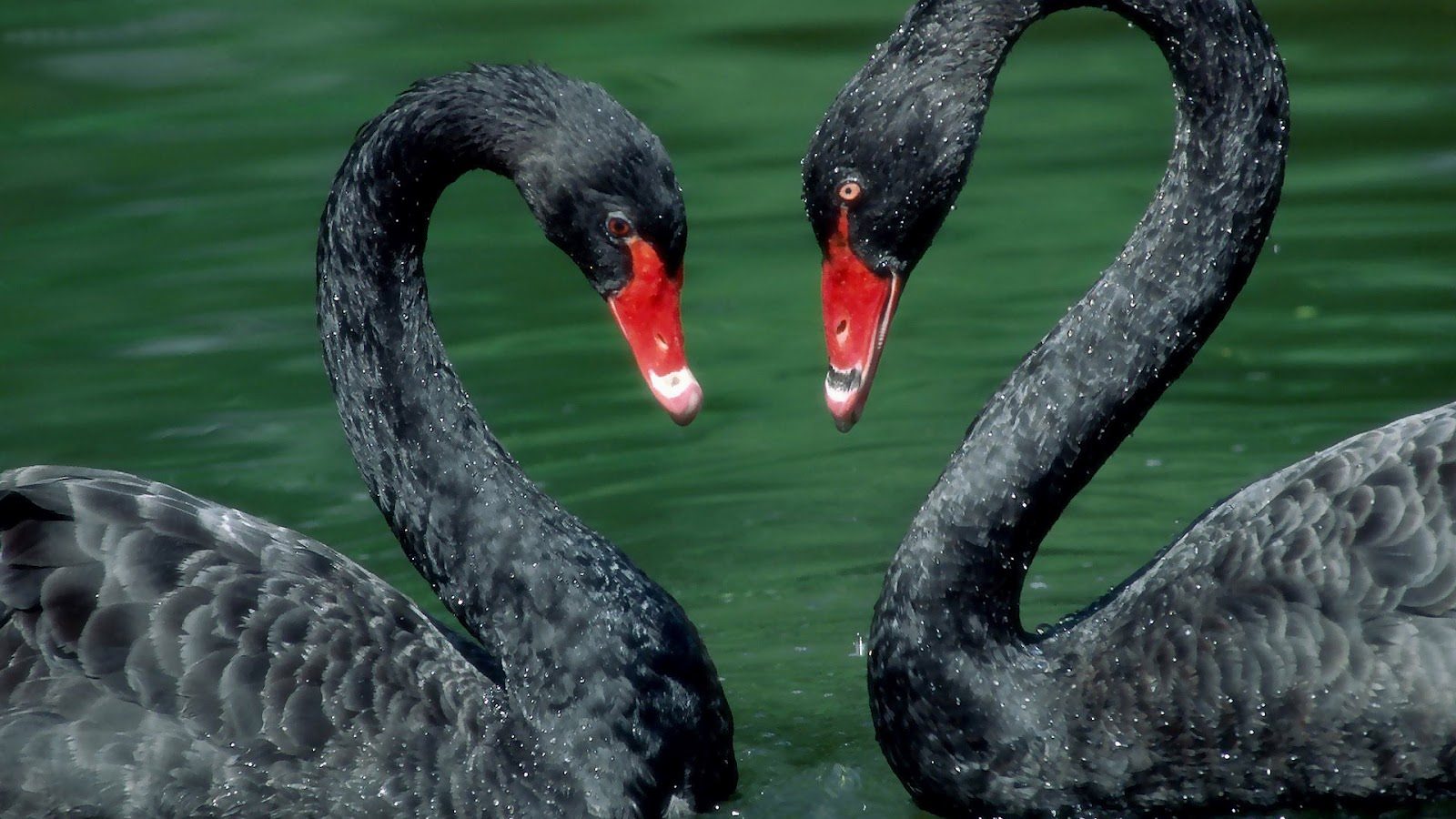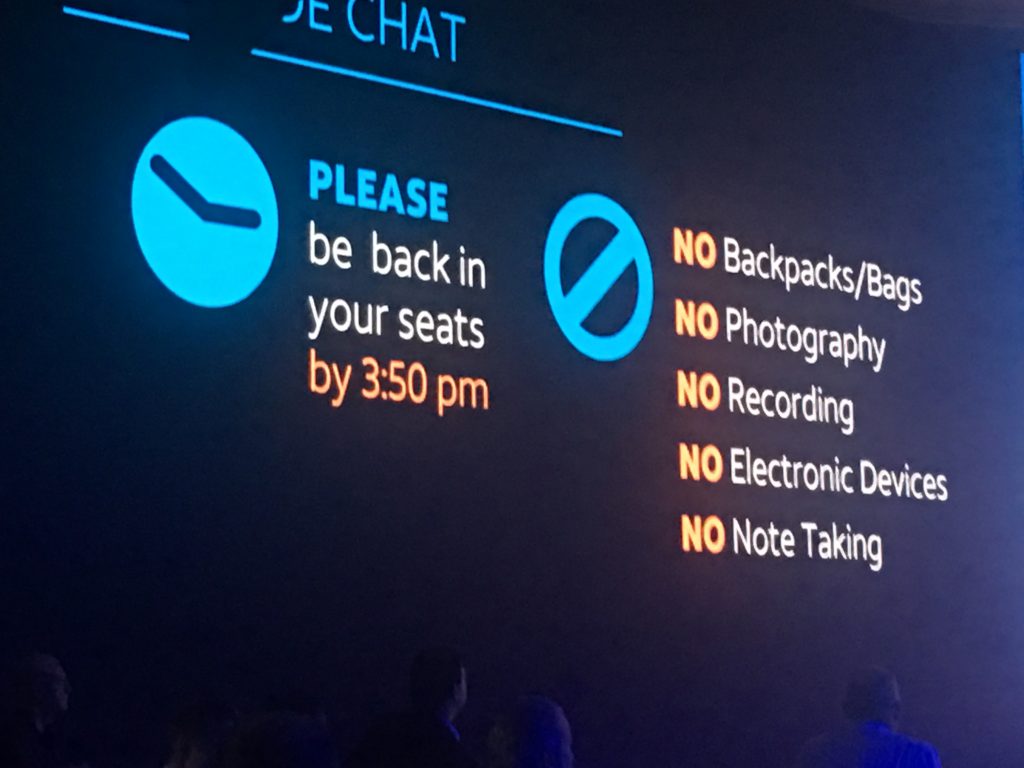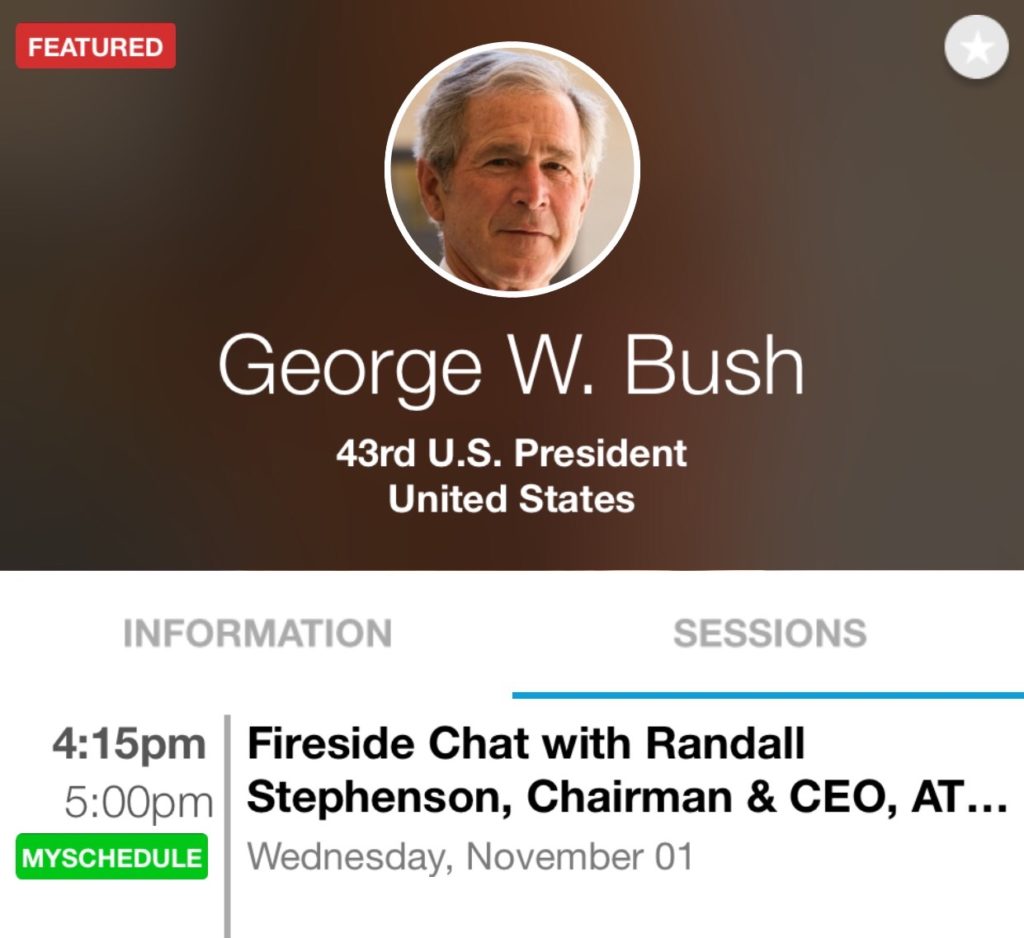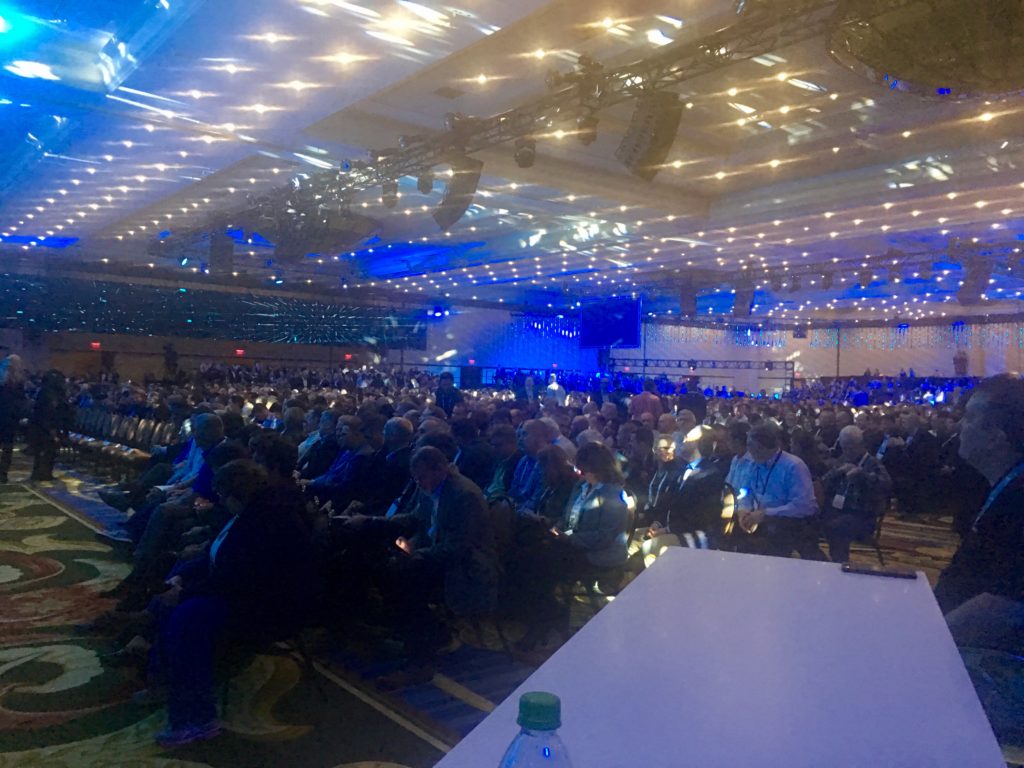
I just listened to George W. Bush being interviewed by AT&T CEO and Chairman, Randall Stephenson, and it was an interesting experience. For example, I’ve heard Bill Clinton speaking and Mikhail Gorbachev (twice), but this event was clearly far more security conscious than those. I mean we’re at an event with lots of corporate bozos who have been handpicked as AT&T customers to fly from around the world and join the conference. So, I was surprised when I saw the signs going up in the morning that, for those who come to George’s speech, there would be no filming, no electronic devices allowed and even no note-taking.
Equally, the area was cordoned off beforehand, with secret service people everywhere. It amused me at this point to think they were secret service, when they were so darned easy to spot. Then we all had to be in our seats 15 minutes before the former Commander in Chief took the stage, and announcements regularly to turn off all communication devices. I was tempted to try to get a snap, but the guy with the earpiece breathing down my neck made me think twice. Hence, this blog is from memory and has no photographic evidence of me being there apart from this shot from the agenda …
… and this shot of the crowd a few minutes before Mr. Bush walked on stage.
There you go. Luckily, there was not a sign saying, ‘no listening and no memorising’ so here’s my take on what he had to say.
First and foremost, he is Presidential. I find it surprising that I say that, as for the eight years he was in office I, along with most of the world, was lamenting the loss of the hugely diplomatic and globally liked womaniser Bill Clinton. Following in his big footsteps would have been hard for anyone, but George W. sneaked in to the Oval Office at the expense of Al Gore, and managed two terms as president. This was because, back in the 2000s, George W’s presidency was pretty much defined by two big moments: 9/11 and the financial crisis. Not great moments in history. There was Hurricane Katrina and other big events, but those two doozies take the prize.
So, there was a lot discussion about Saddam Hussein, Iraq, the War on Terror and those big decisions. Those decisions were easier to make on Capitol Hill when the decision makers saw $1.4 trillion of wealth wiped out in five days however. In fact, it was noted that Bush’s presidency saw more bipartisan acts pass through Washington than ever before. George said that it was because they had to find a way for democrats and republicans to work together, and singled out Ted Kennedy as a particular contact. He said that they just found areas they had in common, and then worked out how to deal with the areas they disagreed. It took a lot of personal diplomacy, but they got there. In fact, it may surprise some, but George Bush senior and George W. are good friends with the Clintons, and I guess that this is the power structure that Donald Trump wants to break.
Talking of the Middle East, he is optimistic for the future and believes that women will make the difference to achieve peace. You cannot ignore half the population of a country, and women are getting emancipation more and more. As they do, they will tell their fathers, sons and husbands that peace is the answer, is George's hope. He also talked about writing the book about his father, 41 (George senior is the 41st President and George W. the 43rd). He noted that his father, along with 1000s of Americans, fought the Japanese in World War II as the enemy and yet, one of the first calls he received on September 12, 2001, was from the Japanese President saying that Japan stands side-by-side with its ally, the USA. Enemies can become allies, and vice versa.
George didn’t make any specific comments on Donald Trump, but did make some statements that give away how he feels. He feels that the Office of the President is more important than the occupant of that office; that President’s should be recognised by their record, and not spend time being rude about or to others; that the Office should have a dignified presence, which is why George W. would never have used Twitter to communicate; and more. Each time such comments were made, a big round of applause from the appreciative audience.
He is also very humorous and has humility. For example, he has written three books and made the comment that this might surprise some people, as they didn’t think he could read. In another anecdote, he was due to play a round of golf with the press corps one day, when a big explosion had happened in Baghdad, killing many US soldiers. He didn’t play golf. It was not right. He did state that the press corps are critical to a Presidency as a follow-on, another note for Trump. He believes there needs to be a strong press corps to air policy with, as how can a President tell another world leader they disapprove of their actions if a 1,000 fake news sites can hide that message.
I didn’t realise that he now runs a veterans programme for US soldiers, and he said that this was to deal specifically with Post Traumatic Syndrome (PST). He pointed out that it’s not PSTD, as a Disorder implies you’re ill and you’re the problem. It’s a disease that can be cured, not a stigma you have to hide.
I guess that this was part of the reason why AT&T got George to be there, as they have a stated objective of hiring 10,000 veterans by 2020, having hired 10,000 already over the past three years.
It was the discussion of the global financial crisis I was most keen to hear about.
As George W. stated several times, he likes to surround himself with smart people and Hank Paulson and Ben Bernanke were the two smartest guys around on September 15, 2008, when Lehman Brothers collapsed. Hank told him that he needed to bail the banks out, but George W. wasn’t sure. He wanted to let them go. Let them fail. Bernanke then said: “you let them fail, and we have another Great Depression”. Remember, this was the guy who wrote his post-graduate degree thesis on the Great Depression. That was the convincer and led George W. to approve the Troubled Asset Relief Program (TARP) where all the big American banks got a shot of billions of dollars of support - $450 billion to be exact - just when it was needed.
Bernanke was right. Looking back, the US economy recovered far faster from the crisis than Europe, specifically because of TARP. The trouble is that taking citizen’s taxes and giving them to the banks that citizens owe their mortgages and debts to, is not popular. As one counsel told him, “you’ve just been pulled into the swamp of Wall Street”.
Hmmmm.
The real issue is that it led to millennials challenging the whole idea of democratic capitalism. That’s what worried Bush the most, that kids would reject the whole system that makes America great. When they challenge that view, he tells them to go look at Venezuela or Zimbabwe and see if they prefer state-controlled capitalism. That got a big applause too.
So, there you go. I did no note-taking or recording during the speech, and this is all from memory. My walkaway is that Bush had a tough act to follow. Clinton was amazingly charismatic, and Bush was not. He appeared to be some dumb, Southern Republican, who got into office and didn’t know what to do. That’s how the Oliver Stone movie W. portrayed, and it’s what many might believe. But Bush in hindsight is actually a very funny, engaging speaker, who some would say achieved a lot during a very difficult Presidency that suffered two big black swans.
You can make your own mind up, and it might do you no harm to read his books, so that you can form an informed opinion.
Chris M Skinner
Chris Skinner is best known as an independent commentator on the financial markets through his blog, TheFinanser.com, as author of the bestselling book Digital Bank, and Chair of the European networking forum the Financial Services Club. He has been voted one of the most influential people in banking by The Financial Brand (as well as one of the best blogs), a FinTech Titan (Next Bank), one of the Fintech Leaders you need to follow (City AM, Deluxe and Jax Finance), as well as one of the Top 40 most influential people in financial technology by the Wall Street Journal's Financial News. To learn more click here...




